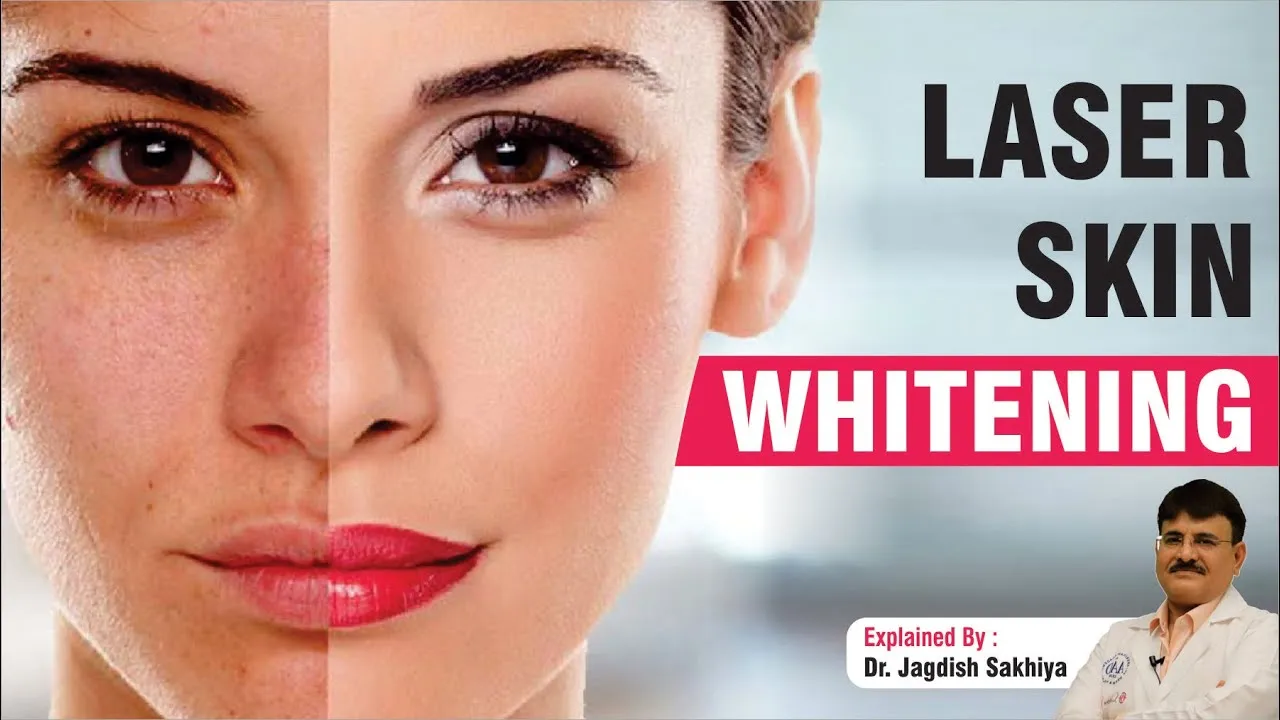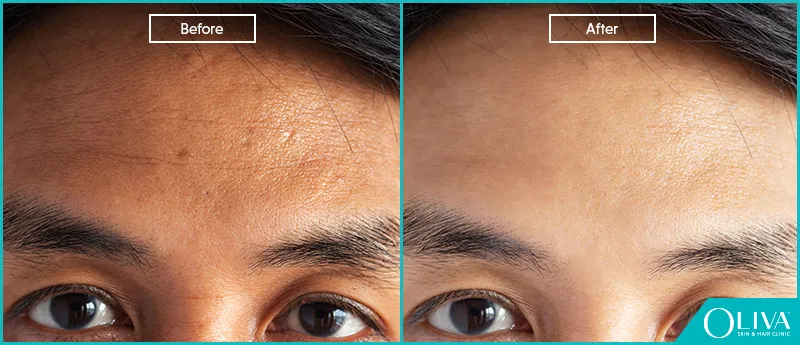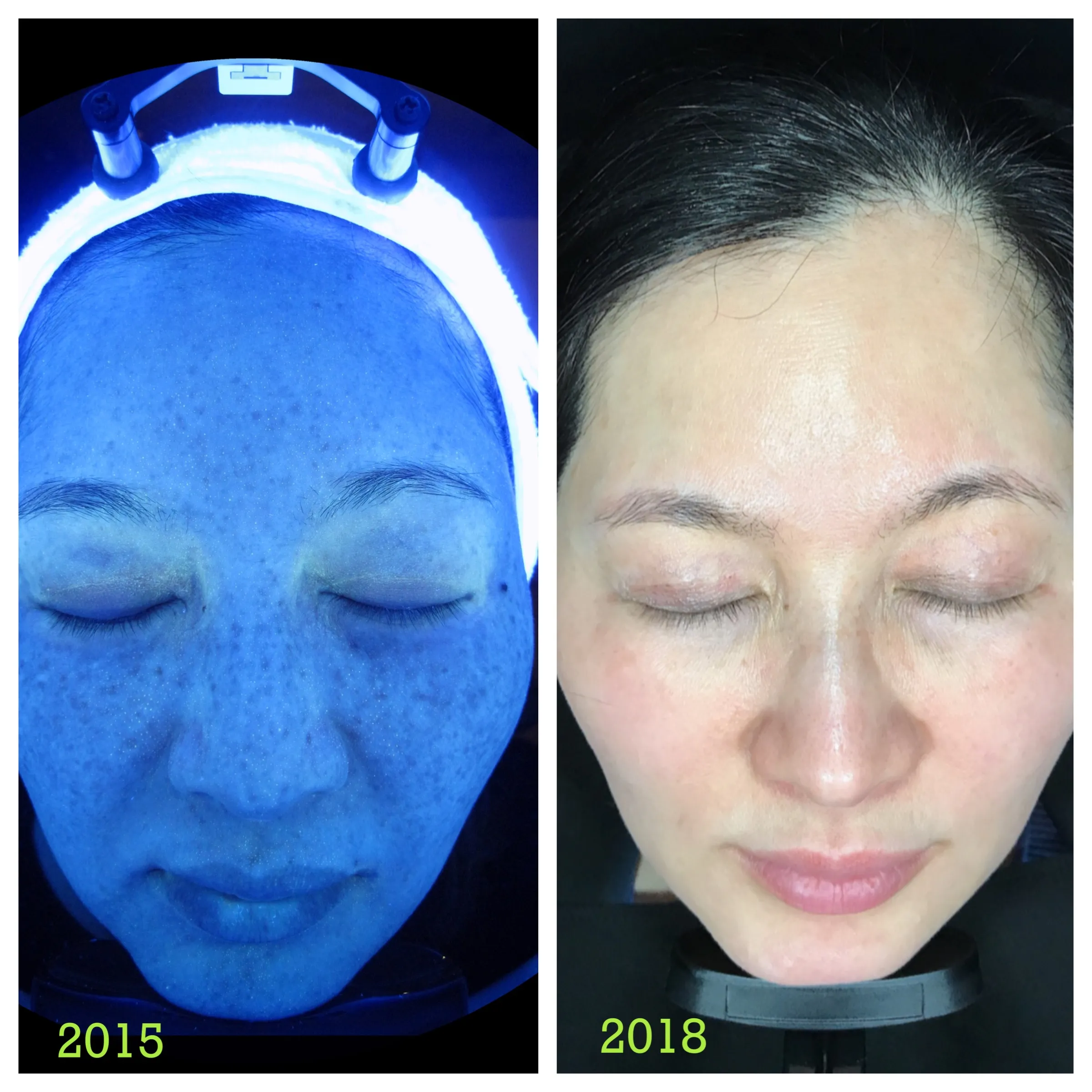What is Laser Whitening for the Face
Laser whitening for the face is a cosmetic procedure designed to improve skin tone and reduce the appearance of various skin imperfections. It utilizes laser technology to target and break down melanin, the pigment responsible for dark spots, uneven skin tone, and other discolorations. This process stimulates the skin’s natural renewal process, leading to a brighter, more even complexion. It’s a popular choice for those seeking a non-invasive method to achieve a more youthful and radiant appearance. Unlike chemical peels or other harsh treatments, laser whitening is often preferred for its precision and ability to target specific areas of concern. The effectiveness of laser whitening can vary depending on the individual’s skin type, the specific type of laser used, and the underlying skin condition being treated. Consulting with a qualified dermatologist or cosmetic specialist is essential to determine if laser whitening is the right choice for you.
How Laser Whitening Works
Laser whitening works by delivering concentrated beams of light energy to the skin. This energy is absorbed by melanin, the pigment that causes dark spots, sun damage, and uneven skin tone. The laser energy breaks down the melanin into smaller particles, which the body then naturally eliminates. Different types of lasers can be used for facial whitening, each with its own specific wavelengths and properties. Some lasers target the melanin directly, while others stimulate collagen production, which can also improve skin tone and texture. The process typically involves multiple sessions to achieve optimal results, as the laser treatment gradually works to lighten and brighten the skin. The number of sessions required depends on the severity of the skin condition and the individual’s response to the treatment. Understanding the underlying mechanisms of laser whitening helps to appreciate its effectiveness and the importance of consulting with a professional for a personalized treatment plan.
The Laser Whitening Process

The laser whitening process involves a series of steps designed to ensure both safety and effectiveness. Before the actual procedure, a consultation is conducted to assess the patient’s skin type, medical history, and aesthetic goals. This allows the specialist to determine the most appropriate laser and treatment plan. During the procedure, the face is thoroughly cleansed, and a topical numbing cream may be applied to minimize discomfort. The laser is then carefully applied to the targeted areas, and the patient may experience a slight stinging or snapping sensation. After the treatment, the skin is typically red and may feel slightly warm. The specialist will provide detailed aftercare instructions to promote healing and optimize results. Adhering to these instructions is crucial for a successful outcome and to minimize any potential side effects. The entire process, from consultation to aftercare, is designed to provide a safe and effective solution for achieving a brighter and more even complexion. Regular follow-up appointments may be scheduled to monitor progress and make any necessary adjustments to the treatment plan.
Before the Procedure
Prior to undergoing laser whitening, a thorough consultation with a qualified specialist is essential. During this consultation, the specialist will evaluate your skin type, medical history, and any medications you are taking. They will also discuss your expectations and the potential risks and benefits of the procedure. It is crucial to be transparent about your skincare routine, including any products you are using. Avoiding sun exposure and tanning beds for several weeks before the treatment is highly recommended to minimize the risk of complications. The specialist may advise you to stop using certain skincare products, such as retinoids or exfoliating agents, before the procedure. This preparation helps to ensure the best possible outcome and reduces the likelihood of adverse reactions. By following the pre-treatment instructions, you can contribute to a smoother and more successful experience with laser whitening for the face.
During the Procedure
During the laser whitening procedure, you will typically be seated comfortably, and your face will be thoroughly cleansed. A topical numbing cream may be applied beforehand to minimize any discomfort. The specialist will use protective eyewear to shield your eyes from the laser light. The laser device will be carefully calibrated and adjusted based on your skin type and the specific areas being treated. The specialist will move the laser handpiece across the skin, delivering pulses of light energy. You may experience a slight stinging, snapping, or warming sensation during the treatment. The duration of the procedure varies depending on the size of the treatment area, but it typically takes between 30 minutes to an hour. Throughout the process, the specialist will monitor your skin’s response and adjust the settings as needed. After the treatment, the specialist may apply a soothing cream or cooling compress. The immediate after-effects usually involve redness and mild swelling, which typically subside within a few days. Following the specialist’s instructions and taking the post-treatment care steps are essential for optimal results.
After the Procedure

After a laser whitening treatment, it is crucial to follow the aftercare instructions provided by your specialist. This typically includes avoiding direct sun exposure and using a broad-spectrum sunscreen with a high SPF. Applying a gentle moisturizer to keep the skin hydrated is also recommended. Avoid picking or scratching the treated areas, as this can lead to scarring or infection. You may experience some redness, swelling, or mild discomfort, which usually subsides within a few days. Over-the-counter pain relievers can be taken if necessary. Your specialist may recommend specific skincare products to help soothe and protect the skin. Regular follow-up appointments will be scheduled to monitor your progress and assess the results. During these appointments, the specialist can address any concerns and make any necessary adjustments to the treatment plan. By adhering to the aftercare instructions, you can promote healing, minimize the risk of complications, and optimize the results of your laser whitening treatment. Remember to be patient, as the full effects of the treatment may take several weeks to become apparent.
Top 7 Benefits of Laser Whitening Face
Improved Skin Tone and Texture
One of the primary benefits of laser whitening is the improvement in overall skin tone and texture. The laser targets and breaks down melanin, leading to a more even complexion and a reduction in areas of hyperpigmentation. This results in a brighter, more radiant appearance. Moreover, the laser treatment can stimulate collagen production, which helps to improve the skin’s elasticity and firmness. This contributes to a smoother and more youthful texture. Over time, the skin becomes more supple, and the appearance of fine lines and wrinkles is minimized. The combination of these effects leads to a significant enhancement in the overall quality and appearance of the skin. The benefits are typically seen over a series of treatments, with each session contributing to further improvements. It’s a comprehensive approach to skin rejuvenation, addressing multiple concerns simultaneously.
Reduced Appearance of Dark Spots

Laser whitening is highly effective in reducing the appearance of dark spots, such as age spots, sunspots, and post-inflammatory hyperpigmentation. The laser targets the melanin in these spots, breaking it down and allowing the body to naturally eliminate it. Over time, these dark spots fade, leading to a more even and uniform skin tone. This can significantly improve the overall appearance of the face, making it look more youthful and refreshed. The precision of the laser allows it to target specific areas of concern, minimizing damage to the surrounding healthy skin. The results are often long-lasting, providing a significant improvement in skin clarity. Regular maintenance and sun protection are essential to prevent the recurrence of dark spots. Laser whitening provides a targeted and effective solution for addressing these common skin imperfections.
Diminished Fine Lines and Wrinkles
While laser whitening primarily targets pigmentation, it can also help to diminish the appearance of fine lines and wrinkles. This is due to the stimulation of collagen production, which is a key protein responsible for skin’s firmness and elasticity. As collagen production increases, the skin becomes plumper and more resilient, reducing the visibility of wrinkles and fine lines. The laser energy encourages the skin to repair and rejuvenate itself, leading to a smoother and more youthful appearance. This anti-aging effect is a valuable added benefit of laser whitening. While it may not be as effective as dedicated wrinkle treatments, it provides a noticeable improvement in the overall skin texture and can help to delay the signs of aging. The combination of reduced pigmentation and improved skin firmness results in a more refreshed and youthful complexion.
Enhanced Collagen Production
Laser whitening stimulates collagen production, a critical protein for maintaining skin’s structure and elasticity. Collagen provides the scaffolding that keeps skin firm, plump, and wrinkle-free. As we age, collagen production naturally declines, leading to wrinkles and sagging skin. The laser treatment encourages the skin to produce more collagen, reversing some of the effects of aging. This enhanced collagen production leads to a visible improvement in skin texture, making it appear smoother, firmer, and more youthful. The increase in collagen also helps to reduce the appearance of fine lines and wrinkles. The skin’s overall health is enhanced, leading to a more radiant and rejuvenated complexion. The benefits of enhanced collagen production extend beyond the cosmetic, improving skin health and resilience.
Minimized Pore Size

Laser whitening can help to minimize the appearance of enlarged pores. The laser energy encourages the skin to remodel and tighten, which can reduce the size of pores. This results in a smoother and more refined skin texture. Smaller pores also make the skin appear more even and less prone to blemishes. As the skin’s overall health improves, the pores naturally become less noticeable. The reduction in pore size contributes to a more flawless and radiant complexion. This benefit is particularly advantageous for individuals with oily skin or those prone to acne. Regular laser treatments can help to maintain the results and keep pores minimized. The combined effects of laser whitening contribute to a significantly improved skin texture and appearance.
Reduced Redness and Inflammation
Laser whitening treatments can help to reduce redness and inflammation in the skin. Certain types of lasers target blood vessels, reducing their visibility and thereby minimizing redness. This can be particularly beneficial for individuals with rosacea or other conditions that cause facial redness. The laser energy also helps to calm inflammation, promoting a more even skin tone. This can lead to a significant improvement in the overall appearance of the skin, making it look less irritated and more balanced. The reduction in redness and inflammation also contributes to a more comfortable skin experience. Laser treatments offer a non-invasive solution for addressing these common skin concerns. As the skin heals and regenerates, the redness and inflammation subside, leading to a clearer and more radiant complexion. The gentle nature of the laser treatments helps to ensure minimal discomfort and a quick recovery time.
Long-Lasting Results
The results of laser whitening treatments are often long-lasting. While the skin will continue to age naturally, the improvements in skin tone, texture, and clarity can be maintained for an extended period. To maximize the longevity of the results, it is essential to follow a good skincare routine, including the regular use of sunscreen. Avoiding excessive sun exposure and protecting the skin from environmental damage are also important. Periodic maintenance treatments may be recommended to sustain the results and address any new areas of concern. The combination of laser treatments and proper skincare practices can help to keep skin looking youthful and radiant for years to come. Laser whitening offers a significant and durable improvement in skin appearance, providing a long-term solution for those seeking a brighter and more even complexion.
Who is a Good Candidate for Laser Whitening Face?

Good candidates for laser whitening for the face typically include individuals with skin concerns such as hyperpigmentation, age spots, sunspots, and uneven skin tone. Those seeking to improve their skin’s overall texture and reduce the appearance of fine lines and wrinkles may also benefit from the treatment. Individuals with fair to medium skin tones often experience the best results, as the laser targets the pigment in the skin. It’s essential to have realistic expectations about the outcomes. Ideal candidates are in good overall health and do not have any active skin infections or conditions that could interfere with the healing process. A consultation with a qualified specialist is crucial to determine if laser whitening is the right choice for your specific skin type and concerns. The specialist will assess your skin and provide a personalized treatment plan to help you achieve your aesthetic goals. Commitment to post-treatment care, including sun protection, is also essential for optimal results. The selection of candidates focuses on ensuring both safety and effectiveness.
Who Should Avoid Laser Whitening Face?
Not everyone is a suitable candidate for laser whitening for the face. Individuals with very dark skin tones may be at a higher risk of developing hyperpigmentation or other complications. Those with active skin infections, open wounds, or a history of keloid scarring should also avoid the treatment. Pregnant or breastfeeding women are generally advised to postpone laser procedures due to potential risks. Individuals taking certain medications that increase sun sensitivity should also consult with their doctor before undergoing laser whitening. It is crucial to disclose your complete medical history and any medications you are taking during the consultation. The specialist can then assess your suitability and recommend alternative treatments if necessary. The primary goal is to ensure patient safety and prevent any adverse outcomes. Understanding the contraindications is essential for making an informed decision about laser whitening for the face.
Potential Risks and Side Effects
While laser whitening is generally considered safe, potential risks and side effects do exist. These can include temporary redness, swelling, and mild discomfort immediately after the procedure. Some individuals may experience changes in skin pigmentation, such as hyperpigmentation or hypopigmentation, although these are usually temporary. Other potential side effects include blistering, scarring, and infection, which are rare but possible. Following the aftercare instructions provided by your specialist is crucial to minimize these risks. Choosing a qualified and experienced specialist is also essential. Discussing your concerns and any medical history with your specialist before the procedure is crucial to make an informed decision. Most side effects are mild and resolve within a few days or weeks. The benefits of laser whitening typically outweigh the risks when the procedure is performed by a trained professional and proper aftercare is followed. Understanding the potential side effects helps patients to prepare and make an informed decision.
How to Prepare for a Laser Whitening Face Treatment

Proper preparation is key to ensuring a successful laser whitening treatment. A consultation with a qualified specialist is the first step. During this appointment, discuss your medical history, skin concerns, and expectations. Avoid sun exposure and tanning beds for several weeks before the procedure, and apply sunscreen daily. Stop using products containing retinoids, AHAs, or BHAs a week or two before the treatment. Inform your specialist about any medications you are taking, including over-the-counter drugs and supplements. Avoid waxing, electrolysis, or chemical peels on the treatment area for at least two weeks before the procedure. On the day of the treatment, arrive with a clean face, free of makeup and skincare products. Following these guidelines will help to minimize the risk of complications and optimize the results of your laser whitening treatment. Careful preparation lays the groundwork for a smoother, safer, and more effective experience.
Post-Treatment Care and Maintenance
Following the post-treatment care instructions provided by your specialist is vital for optimal results and minimizing complications. Avoid direct sun exposure and use a broad-spectrum sunscreen with a high SPF, even on cloudy days. Gently cleanse your face with a mild cleanser and pat dry. Apply a soothing moisturizer to keep your skin hydrated. Avoid picking or scratching the treated areas, as this can lead to scarring or infection. Use lukewarm water when washing your face and avoid hot showers. Avoid strenuous activities and excessive sweating for a few days. Schedule follow-up appointments with your specialist to monitor your progress. Maintain a consistent skincare routine, including cleansing, moisturizing, and sun protection, to preserve the results. By adhering to these aftercare guidelines, you can promote healing, prevent complications, and enjoy the long-term benefits of your laser whitening treatment. Proper care ensures the longevity and effectiveness of the procedure. Consistent and careful post-treatment care is a critical component of a successful outcome.
Conclusion
Laser whitening for the face offers a powerful solution for addressing a variety of skin concerns, from uneven skin tone and dark spots to fine lines and wrinkles. With its ability to stimulate collagen production, reduce pigmentation, and improve skin texture, it’s a popular choice for those seeking a more radiant and youthful appearance. While potential risks and side effects exist, they can be minimized by choosing a qualified specialist, following pre- and post-treatment instructions, and maintaining a consistent skincare routine. Laser whitening can provide long-lasting results, enhancing your skin’s natural beauty. Before undergoing the procedure, it is crucial to consult with a specialist to determine if laser whitening is right for you. With proper care and maintenance, you can enjoy the transformative benefits of this advanced cosmetic treatment and achieve a clearer, brighter, and more confident complexion. The benefits of the treatment extend beyond aesthetics, as improved skin health and appearance can boost self-esteem and well-being. Laser whitening represents a significant advancement in non-invasive cosmetic procedures, offering a safe and effective way to achieve a more youthful and radiant look. The investment in professional treatment combined with diligent post-treatment care provides a path to achieving and maintaining glowing skin.
